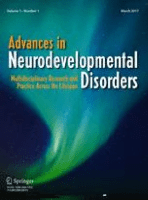
Advances in Neurodevelopmental Disorders
Scope & Guideline
Empowering Knowledge in Neurodevelopmental Disorders
Introduction
Aims and Scopes
- Neurodevelopmental Disorders Research:
The journal emphasizes research on various neurodevelopmental disorders, including Autism Spectrum Disorder (ASD), Attention-Deficit/Hyperactivity Disorder (ADHD), and rare genetic conditions, aiming to improve diagnosis, treatment, and outcomes. - Intervention Studies:
A significant focus is on intervention strategies, including behavioral therapies, parent-mediated interventions, and innovative approaches like telehealth and technology integration to enhance the quality of life for affected individuals. - Qualitative and Mixed Methods Research:
The journal values qualitative and mixed methods research that explores lived experiences, caregiver perspectives, and socio-cultural factors impacting neurodevelopmental disorders, thereby enriching the scientific discourse. - Policy and Ethical Considerations:
It also addresses policy implications, ethical considerations, and human rights aspects related to neurodevelopmental disorders, advocating for better support and resources for individuals and families. - Innovative Technological Approaches:
There is a notable interest in the application of technology, such as virtual reality and mobile health applications, to support assessment and intervention in neurodevelopmental disorders.
Trending and Emerging
- Cultural and Linguistic Adaptations in Interventions:
There is a growing emphasis on adapting interventions to meet the cultural and linguistic needs of diverse populations, indicating a recognition of the importance of context in treatment efficacy. - Technology-Enhanced Interventions:
The use of technology, such as virtual reality and mobile applications, is trending, showcasing innovative methods for assessment and intervention that can improve engagement and outcomes. - Focus on Co-occurring Conditions:
Research addressing co-occurring conditions, such as anxiety and ADHD in individuals with autism, is gaining traction, reflecting a more integrated approach to understanding neurodevelopmental disorders. - Parent and Caregiver Perspectives:
The inclusion of parent and caregiver perspectives in research is increasingly prominent, shedding light on the challenges they face and the support they need, which is crucial for effective intervention. - Rights and Advocacy for Neurodiverse Individuals:
There is a rising focus on the rights and advocacy for individuals with neurodevelopmental disorders, emphasizing social justice and the need for systemic change to improve their quality of life.
Declining or Waning
- Traditional Behavioral Therapies:
There seems to be a decreasing focus on traditional behavioral therapies, as newer, more integrative approaches that consider emotional and social factors gain attention. - Generalized Studies on Neurodevelopmental Disorders:
Research that broadly addresses neurodevelopmental disorders without specificity to particular conditions or populations appears less frequently, suggesting a shift toward more targeted studies. - Basic Neuroscience Research:
There is a waning interest in basic neuroscience research related to neurodevelopmental disorders, likely overshadowed by studies focusing on practical applications and interventions. - Generic Parenting Strategies:
Discussions surrounding generic parenting strategies are becoming less common, as more nuanced, context-specific approaches tailored to individual disorders and family dynamics emerge. - Longitudinal Studies of Single Disorders:
Longitudinal studies focusing solely on one neurodevelopmental disorder without considering comorbidity or overlapping conditions are less frequently published, indicating a trend towards more comprehensive research.
Similar Journals
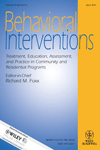
BEHAVIORAL INTERVENTIONS
Enhancing individual and community health through science.Behavioral Interventions, published by Wiley, is a leading academic journal dedicated to advancing the field of behavioral science through the dissemination of innovative interventions aimed at improving individual and community well-being. Since its inception in 1986, this journal has maintained a high standard of peer-reviewed research, currently holding impressive Q1 and Q2 rankings across various categories including Arts and Humanities, Clinical Psychology, and Psychiatry and Mental Health. With a mission to bridge theoretical insights with practical applications, Behavioral Interventions serves as an essential resource for researchers, practitioners, and students alike, providing them with cutting-edge insights and tools to address complex behavioral issues. It is indexed in prestigious databases and continues to contribute significantly to the discourse in behavioral studies, solidifying its position as a vital publication in the field. Available in both print and electronic formats, this journal yearns to expand its reach and impact, fostering collaborative efforts in fostering healthier behaviors across populations.

Current Developmental Disorders Reports
Uncovering the complexities of developmental psychology.Current Developmental Disorders Reports, published by SPRINGERNATURE, is a crucial resource for researchers, practitioners, and students in the fields of developmental psychology, psychiatry, and neuroscience. Since its inception in 2014, this journal has aimed to disseminate cutting-edge research on the multifaceted nature of developmental disorders, providing valuable insights into causation, diagnosis, and intervention strategies. With an E-ISSN of 2196-2987 and a notable standing in the Q3 quartile across multiple fields—developmental and educational psychology, developmental neuroscience, and psychiatry and mental health—this journal holds a significant position in the academic landscape. Researchers contributing to the journal benefit from its open access policies, stimulating knowledge sharing and dialogue within the scientific community. The journal’s commitment to advancing understanding in these critical areas of study is reflected in its rigorous publication standards and diverse range of articles, making it an essential read for anyone invested in the developments in mental health and developmental disorders.

PSYCHIATRIC GENETICS
Exploring the Intersection of Genes and PsychiatryPSYCHIATRIC GENETICS, published by LIPPINCOTT WILLIAMS & WILKINS, is a pivotal journal dedicated to the interdisciplinary study of genetic factors in psychiatric disorders, bridging the fields of genetics, psychiatry, and neuroscience. With a commitment to advancing research from its inception in 1990 and continuing through 2024, the journal provides a platform for innovative studies and findings that explore the genetic underpinnings of mental health. Although not currently an Open Access publication, it reaches a wide audience concerned with the complex interplay between genetics and psychiatric conditions, contributing to its Q3 and Q2 quartile rankings across multiple relevant categories in 2023. The importance of this journal cannot be understated; it serves as a crucial resource for researchers, clinicians, and students eager to uncover insights that could lead to more effective interventions and treatments in the realm of mental health.

Review Journal of Autism and Developmental Disorders
Unveiling insights into autism and beyond.Review Journal of Autism and Developmental Disorders, published by Springer Heidelberg, stands as a leading platform for the dissemination of groundbreaking research in the realm of autism and developmental disorders. With an ISSN of 2195-7177 and an E-ISSN of 2195-7185, this journal not only showcases high-quality research but also emphasizes the crucial intersections between behavioral neuroscience, cognitive neuroscience, developmental neuroscience, and psychiatry. Notably, the journal has achieved a prestigious Q1 ranking across these categories, reflecting its impact and relevance; it ranks 10th in behavioral neuroscience and 5th in developmental neuroscience within Scopus metrics. Spanning from 2014 to 2024, the journal is dedicated to fostering a deeper understanding of autism spectrum disorders and related conditions, making it indispensable for researchers, clinicians, and students alike. While it operates under a traditional access model, the quality of the peer-reviewed articles ensures that it remains a valuable resource in the academic community.

Neuropsychiatric Disease and Treatment
Transforming Understanding into Effective TreatmentsNeuropsychiatric Disease and Treatment, published by DOVE MEDICAL PRESS LTD, is a prominent open access journal dedicated to advancing the field of neuropsychiatry. Since its inception in 2009, this journal has provided a platform for the dissemination of high-quality research on innovative therapies and treatments for neuropsychiatric disorders. With an impressive Q2 ranking in Psychiatry and Mental Health and a Q3 ranking in Biological Psychiatry as of 2023, it holds a reputable position within the scholarly community, reflecting its commitment to impactful research. The journal's open access model ensures widespread accessibility, fostering collaboration and dialogue among researchers, clinicians, and students worldwide. The journal accepts a variety of article types, including original research, reviews, and case studies, encompassing a range of topics from pathophysiology to therapeutic advancements. With its base in New Zealand and a Scopus rank placing it within the 69th percentile of Psychiatry and Mental Health, Neuropsychiatric Disease and Treatment is an essential resource for those dedicated to understanding and treating the complexities of neuropsychiatric conditions.

Analysis of Verbal Behavior
Enhancing understanding of verbal interactions and their implications.Analysis of Verbal Behavior is a premier academic journal dedicated to advancing the understanding of verbal behavior and its applications within various disciplines, including psychology, linguistics, and education. Published by Springer, a prominent name in scholarly publishing, this journal serves as a vital resource for researchers, professionals, and students alike. With an ISSN of 0889-9401 and an E-ISSN of 2196-8926, it is accessible through traditional subscriptions, further enhancing its reach among the academic community. The journal is committed to disseminating high-quality research, including empirical studies, theoretical analyses, and practical applications, thereby contributing significantly to the field of behavior analysis. Scholars looking to stay current on the latest developments and methodologies in verbal behavior will find Analysis of Verbal Behavior essential for their professional and academic pursuits.
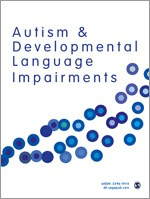
Autism & Developmental Language Impairments
Enhancing lives through groundbreaking research in language impairments.Autism & Developmental Language Impairments is a pioneering peer-reviewed journal published by SAGE Publications Inc that focuses on advancing the understanding of autism spectrum disorders and language impairments across the developmental spectrum. Since its inception in 2016, this open access journal has provided a platform for researchers, practitioners, and educators to disseminate innovative research findings, clinical practices, and theoretical insights, reaching a global audience. The journal is notably indexed in prestigious databases and has established its credibility with a remarkable Rank of Q2 in both Clinical Psychology and Developmental and Educational Psychology as of 2023, solidifying its importance in these vital fields. Based in the United Kingdom, it addresses crucial issues in mental health, reflecting a commitment to fostering advancements that seek to enhance the lives of individuals affected by developmental language impairments. As it converges into its next phase from 2016 to 2024, Autism & Developmental Language Impairments continues to play an essential role in bridging gaps between academia and practice, making it an invaluable resource for researchers, clinicians, and students dedicated to this critical area of study.

Behavior Analysis in Practice
Empowering Change Through Evidence-Based Strategies.Behavior Analysis in Practice, published by Springer, is a premier peer-reviewed journal dedicated to the practical application of behavior analysis principles and techniques. With the ISSN 1998-1929 and E-ISSN 2196-8934, this journal serves as a vital resource for researchers, practitioners, and students interested in the implementation of behavior analytic strategies across various settings, including education, therapy, and organizational practices. Although it operates under a subscription model, the journal emphasizes high-quality, empirical research that aims to bridge the gap between theoretical frameworks and real-world applications, making it indispensable for professionals seeking innovative approaches to behavior management. Situated at One New York Plaza, Suite 4600, New York, NY 10004, United States, this journal not only contributes significantly to the field of behavior analysis but also encourages the dissemination of knowledge that enhances evidence-based practice globally.
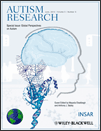
Autism Research
Pioneering insights into the complexities of autism spectrum disorders.Autism Research, published by WILEY, is a premier academic journal dedicated to advancing the understanding of autism spectrum disorders (ASD) through high-quality research and clinical studies. With the ISSN 1939-3792 and E-ISSN 1939-3806, this journal has been integral to the field since its inception in 2008 and has been consistently ranked in the Q1 quartile across categories such as Genetics (clinical), Neurology (clinical), and various facets of Neuroscience. Holding prominent Scopus ranks, including #18 in Genetics (clinical) and #26 in General Neuroscience, Autism Research provides a vital platform for researchers, clinicians, and students alike to disseminate innovative findings and foster collaborations aimed at improving diagnosis and treatment strategies for individuals with autism. While not an open access journal, it offers a blend of insightful articles and impactful research that is essential for professionals seeking to stay at the forefront of this rapidly evolving field.
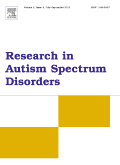
Research in Autism Spectrum Disorders
Pioneering insights into autism spectrum disorders.Research in Autism Spectrum Disorders, an esteemed journal published by ELSEVIER SCI LTD, is dedicated to advancing the understanding of autism spectrum disorders through innovative research and scholarly articles. Since its inception in 2007, the journal has carved out a distinguished place in the field, reflected in its robust 2023 Impact Factor and Q2 ranking in key categories such as Clinical Psychology, Developmental and Educational Psychology, and Psychiatry and Mental Health. By bridging the gap between research and practice, this journal serves as a vital resource for researchers, professionals, and students alike, fostering collaboration and knowledge-sharing among those dedicated to improving outcomes for individuals with autism. Featuring a broad scope that encompasses various aspects of autism research, the journal remains committed to publishing high-quality studies that drive the conversation forward in this critical area of study. Access options for the journal's content are available under the Elsevier guidelines, ensuring that pivotal research reaches a wide audience.